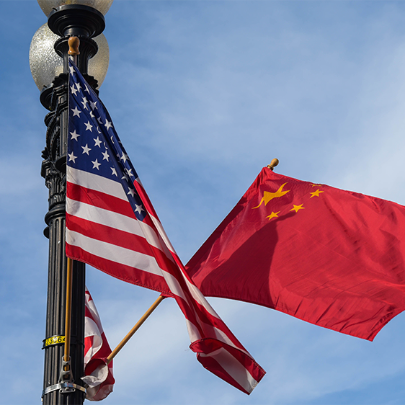



The US-China relationship is "severely strained", but positive changes are possible in 2021, said David Firestein, president and CEO of the George H.W. Bush Foundation for US-China Relations.
"We have to get this right," Firestein said of the relationship. "We need to get back to serious diplomacy and come together with a mindset of problem-solving rather than merely blaming and demonizing."
He believes, as the late former president George H.W. Bush did, that the US-China relationship is "the world's most consequential bilateral relationship, and virtually no global challenge can be resolved in the absence of US-China collaboration. I am troubled by the deterioration in the relationship that we have seen this year and over the last several years."
Firestein said that in the past three or four years, there has been a fundamental shift in Washington's approach and mindset in dealing with China. The result is a pervasive adversarial mindset among US leaders in both the executive branch and Congress.
In 2020, the issue of the COVID-19 pandemic has become a major trust-drainer in the relationship when American political leaders, particularly Republicans, chose to frame COVID-19 in adversarial terms, characterizing China as "the bad guy", he said.
Such framing has taken a serious toll on the leaders' and public's perceptions of China, Firestein said.
"Almost with every passing day, we see some new thing happening, typically on the US side, that marks a new element of deterioration in the relationship. The recent and in my judgment unfortunate US action on visas is just the most recent example," he said.
The US mindset of "decoupling" from China is unrealistic as well as problematic, Firestein said.
"Purely from the US perspective, the notion that the largest economy of the world would decouple from the second-largest economy and soon to be largest economy just makes no sense by any definition.
"We have already seen the categorically negative effects of the misguided, foolish and self-destructive tariff policies of President Trump."
As a result, the United States now has the largest average annual merchandise trade deficit with China of any presidential administration in history, as well as the largest deficits with the world as a whole.
"We turned, under these misguided polices, a historical US-China agricultural surplus into an agricultural deficit. Our nation has lost well over 200,000 manufacturing jobs since January 20, 2017 — the date President Trump took office. And of course, American consumers are paying more in stores for things than they were two or three years ago," he added.
Decoupling is much easier said than done. "We are two, three years into the trade war, but even today, the US-China trade relationship is among the largest in the world by volume. That suggests how difficult it would be to disengage from one another."
The notion of decoupling and dividing the world into two economic trade camps would also be "a horrible idea" for the world, Firestein said.
"The world tried that during the Cold War when the Soviet Union and its bloc and the US and its bloc didn't interact much with each other economically. It didn't work well then and it wouldn't work well going forward for any of us."
He said that the Trump administration's approach to China is based on an erroneous assessment shared by many in Congress that China somehow seeks to displace and replace the United States as the world's only superpower. In fact, China does not intend to become the Unites States 2.0, Firestein said.
"In terms of Chinese political culture, China today is not comfortable with a singular leadership position in the world. China does not want Chinese soldiers dying on foreign battle fields and it does not want targets on the backs of its people placed there by terrorists. It also does not want the financial costs or intrusive global scrutiny associated with being the world's only superpower. In short, it does not want the heavy and lonely responsibilities of global leadership, as global leadership is widely construed and defined today," he said.
Firestein is hopeful that the bilateral relationship will rebound in a more positive direction to at least some degree in 2021, even though it certainly will not be a "night-and-day" change.
"With President Biden, we will see renewed recognition of the reality that the United States and China need to engage each other economically and commercially in order for both countries to prosper," Firestein said.
Firestein said that Joe Biden accurately and appropriately frames China as a formidable competitor to the United States, but added that he will bring a less emotional, less ideological, more rational, more fact-based and more clinical approach to the relationship.
"We are going to get back to the mindset of not 'how do we do decouple?' but rather, 'how do we address and solve the legitimate and real problems in the relationship without decoupling?'" he said.
If you have any problems with this article, please contact us at app@chinadaily.com.cn and we'll immediately get back to you.